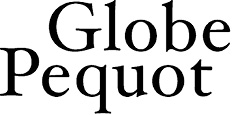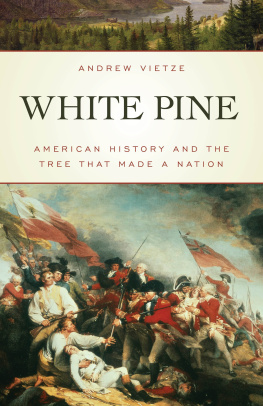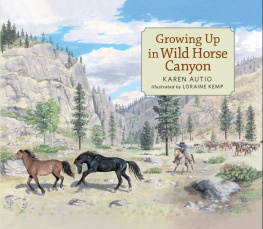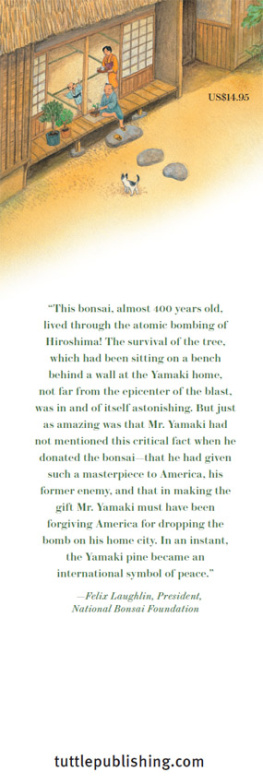Andrew Vietze - White Pine: American History and the Tree That Made a Nation
Here you can read online Andrew Vietze - White Pine: American History and the Tree That Made a Nation full text of the book (entire story) in english for free. Download pdf and epub, get meaning, cover and reviews about this ebook. year: 2017, publisher: Globe Pequot Press, genre: History. Description of the work, (preface) as well as reviews are available. Best literature library LitArk.com created for fans of good reading and offers a wide selection of genres:
Romance novel
Science fiction
Adventure
Detective
Science
History
Home and family
Prose
Art
Politics
Computer
Non-fiction
Religion
Business
Children
Humor
Choose a favorite category and find really read worthwhile books. Enjoy immersion in the world of imagination, feel the emotions of the characters or learn something new for yourself, make an fascinating discovery.
- Book:White Pine: American History and the Tree That Made a Nation
- Author:
- Publisher:Globe Pequot Press
- Genre:
- Year:2017
- Rating:5 / 5
- Favourites:Add to favourites
- Your mark:
- 100
- 1
- 2
- 3
- 4
- 5
White Pine: American History and the Tree That Made a Nation: summary, description and annotation
We offer to read an annotation, description, summary or preface (depends on what the author of the book "White Pine: American History and the Tree That Made a Nation" wrote himself). If you haven't found the necessary information about the book — write in the comments, we will try to find it.
White Pine: American History and the Tree That Made a Nation — read online for free the complete book (whole text) full work
Below is the text of the book, divided by pages. System saving the place of the last page read, allows you to conveniently read the book "White Pine: American History and the Tree That Made a Nation" online for free, without having to search again every time where you left off. Put a bookmark, and you can go to the page where you finished reading at any time.
Font size:
Interval:
Bookmark:
White Pine
White Pine
American History and the Tree That Made a Nation
Andrew Vietze

Guilford, Connecticut

An imprint of Rowman & Littlefield
Distributed by NATIONAL BOOK NETWORK
Copyright 2018 Andrew Vietze
All rights reserved. No part of this book may be reproduced in any form or by any electronic or mechanical means, including information storage and retrieval systems, without written permission from the publisher, except by a reviewer who may quote passages in a review.
British Library Cataloguing in Publication Information available
Library of Congress Cataloging-in-Publication Data available
ISBN 978-1-4930-0907-7 (paperback)
ISBN 978-1-4930-2331-8 (e-book)
 The paper used in this publication meets the minimum requirements of American National Standard for Information SciencesPermanence of Paper for Printed Library Materials, ANSI/NISO Z39.48-1992.
The paper used in this publication meets the minimum requirements of American National Standard for Information SciencesPermanence of Paper for Printed Library Materials, ANSI/NISO Z39.48-1992.
Printed in the United States of America
Thanks go to my wife and two boys, who let me live among the pines, and to my parents for introducing them to me in the first place.
Preface
Between every two pine trees there is a door leading to a new way of life.
John Muir
When I was a boy, I used to walk from tree to tree high above the forest floor, clinging to pitchy pine branches, feet on a bough like a tightrope walker. At the time, we lived forty-five minutes southwest of Boston in a venerable cape built in 1720, with secret alcoves to escape native attacks and, more importantly to me, acres of woods out back. In the small forest backyard was a grove of towering, majestic eastern white pines that jutted far above the tree line, all twisting and arcing. Hundreds of feet tall and too fat for me to wrap my arms around, they were gathered together like some superior order, commanding the neighborhood. Somehow the noble conifers escaped the suburbanization that went on all around them, the growth for growths sake that would see streets of identical houses built in every direction for miles and eventually send my family packingto the Pine Tree State.
I loved those trees.
They were my refuge.
In one was my tree fort, little more than a platform of boards twenty feet up, where I would sit and play for hours. Sometimes Id simply lean back against its trunk and read. Other times Id listen to the wind faintly whisper through the needles as the wind blew, as if it had secrets it wanted to share with me. Sometimes it was make believe Star Wars with my cousin, holding on to the tree like an Ewok of Endor; other times it was a haven from an angry sibling or yelling parent. Often Id watch the sun go down off to the west and reluctantly climb down to go inside. And then there were those rare moments when Id hang on and walk through the canopy from one tree to the next, looking down at the rust-red floor of the forest below.
I loved those trees.
My favorite place, though, was up in Maine, where wed spend a week every summer visiting with family on a peninsula that reached out into one of the Midcoasts many tidal rivers. Once a saltwater farm where my grandmother spent her childhood, our ancestral plot was mostly wide-open meadow, but as you got closer to the water, a narrow forest of pine and oak clung to the riverbank. In those woods were several giant white pines, and they made the same magic sound when the wind blew, filled with their own secrets. They provided us with shade on hot July days, looked over countless family picnics, held a swing that amused generations of us, and wore a carved wooden sign that told us wed arrived.
I loved those trees, too.
Today, I work as a ranger in one of the nations last great wilderness areas, a proud member of the thin green line, protecting the park from the people and the people from the park (mostly the former). My duty station? An old sporting camp that used to be called Twin Pines, for the skyscraping pair of white pine towers that frame a jaw-dropping view of Maines greatest mountain.
Fifteen feet around, seventy-five feet tall, they must be two hundred years old, witness to centuries of lumbering and hunting and now hiking and paddling. Every year they drop giant cones the size of bananas. And lose branches that could take out a car.
The eastern white pine has served as the backdrop of my life. And all of these trees have seen a lot.
The stories they could tell.
Before I began this project, I had no idea exactly how much theyd witnessed. I didnt know how important theyd been to the native peoples, literally keeping them alive during some particularly brutal winters. Or how valuable they were to King James I, who saw in them a way to build the worlds best navy and dominate a continent. Or to the colonists, for whom they became a symbol of revolution. I didnt know that a riot in New Hampshire, which began over the cutting of pines, was the inspiration for the much more famous Boston Tea Party. Or that the rebels saw the tree as so central a theme in the build-up to war that they sewed it onto the flags they carried to the Battle of Bunker Hill. Or that the Massachusetts State House in Boston had sculpted pine cones on its dome, a symbol of the integral role the tree played in New Englands development. I was unaware how much the pine meant to the early builders of America. And I had no idea about the value the tree still has to the economy today, whether in the form of boards for building or in the potions and tinctures that herbalists use to cure our many ailments.
I just knew I loved those trees.
This book doesnt purport to be a comprehensive history of the eastern white pine. I told a group of young writing students at a workshop last year that theres no excuse for academic writing, and Im a man of my word. Besides, who wants to read a doorstop about a tree? Instead its intended to be a collection of stories about this magnificent species and the profound impact theyve had on our world.
Its my attempt to tell the stories they were always trying to whisper to me.
Introduction: White Pine Riot
The only reason why the Rebellion at Portsmouth and the Boston Tea Party are better known than our Pine Tree Riot is because they have had better historians.
William Little
The intruders held the Hillsborough County Sheriff spread-eagled, suspended above the floor of his bed chamber, face down. More than twenty of them gathered around himtwo on each side gripped fast as the others looked ontheir faces painted black with soot. The lawman struggled against them, eyes wide, feet thrashing, kicking over the lamp on the bedside table and sending bedding flying, but they only tightened their hold, resolute underneath their macabre makeup and too numerous to escape.
Dawns first rays were just beginning to glow on the walls of Sheriff Benjamin Whitings room at the Aaron Quimby Inn, in Weare, New Hampshire, when the black-faced men burst through the door. The constable had been asleep but he woke with a start and dove for his guns; the large group easily prevented him from reaching them. They jerked him from his four-poster, stripped the bedclothes off his torso, and wrenched him over so that his naked back faced the ceiling.
Men on each limb clutched Whiting tightly, holding him at waist height, while others brought out the switches. With the snap of a whip but the heft of a stick, the sharp saplings were ideal for what they had in mind, and as the sheriff struggled, rocking to try and pull himself free, the men laid into him, whipping him on the sides and back, keeping at it until he was a raw mess, flesh hanging down, blood dripping onto the rug below. Then they used the sharpened tips of the sticks to dig hash marks into his backeach representing a fine the men owedand dumped him to the floor. As Whiting would say later: They almost killed me.
Next pageFont size:
Interval:
Bookmark:
Similar books «White Pine: American History and the Tree That Made a Nation»
Look at similar books to White Pine: American History and the Tree That Made a Nation. We have selected literature similar in name and meaning in the hope of providing readers with more options to find new, interesting, not yet read works.
Discussion, reviews of the book White Pine: American History and the Tree That Made a Nation and just readers' own opinions. Leave your comments, write what you think about the work, its meaning or the main characters. Specify what exactly you liked and what you didn't like, and why you think so.











